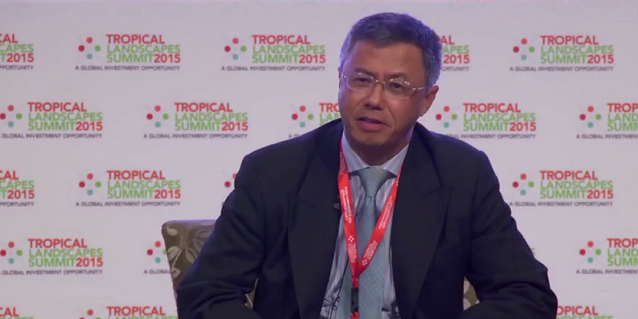21st Forbes Global CEO Conference 2023: Sea Change
The 21st Forbes Global CEO Conference was held from 11-12 September in Singapore, and gathered some 450 prominent business leaders from around the world. The international panel of leading CEOs,...

Latest updates on what's happening in RGE Group

RGE Vice-Chairman Bey Soo Khiang recently attended the Tropical Landscapes Summit 2015 on 27 April organised by the United Nations Office for REDD+ Coordination in Indonesia (ORCID). He was among six speakers at the plenary session, themed “The Challenge of Food Security for All”.
The discussion, chaired by World Agroforestry Centre Director General Dr Tony Simons, invited a cross-section of views, concerns and initiatives related to food security amongst representatives from the government, non-government organisations (NGO) and private sector.
Food security remains a complex issue that includes concerns around access to healthy food and optimal nutrition. Access is affected by a confluence of factors such as poverty, environmental health and climate change, micro and macro economics, land use change, and population. The session had a strong focus on multi-stakeholder (state, private sector, people) collaboration. Dr Simons said that while agriculture can be a solution in food security.
Aptly, Mr Bey [speaking at the 19:22 mark of the above video] touched on palm oil and smallholder partnerships, citing Asian Agri as a model corporate partner in food security governance. Asian Agri, part of the group of companies managed by RGE, is a pioneer corporate partner in the Indonesian government-initiated Plasma scheme, and its active involvement has raised the living standards of smallholders and their families. Mr Bey said:
How do we move forward to meet the increasing demand for palm oil for food security while meeting the pledge we made at the UN? Our current business model (which includes partnering smallholders) remains even more relevant going forward.
He elaborated on how Asian Agri will continue to improve the yields of its plantations, which include those of smallholders. The company will partner smallholders to replant with the best seeds, and help them seek financial assistance until the new trees mature.
For almost three decades, the palm oil company has engaged smallholders and empowered them with tools, skills training, education, infrastructure and put in place initiatives and programmes that not only guarantee but also diversify and raise farmers’ incomes. There are also concerted efforts to ensure smallholders adopt sustainable practices and receive certification (e.g. ISCC, RSPO).
During the Q&A session, Mr Bey briefly touched on how Asian Agri’s private-community partnership model played a pivotal role in helping smallholders increase productivity and offering financial assistance. He cited the building of schools and day-care centres to “create a win-win situation for smallholder families”.
In addressing questions on spatial planning and whether there would be a limit to the expansion of the oil palm plantation, he cited constraints and challenges, saying [at the 1:05:15 mark of the video]:
Although the forestry side was assigned 10m ha of land, in reality, I think at most 4m ha has been given out. Most of the land is not issued in terms of licenses…
From a spatial point of view, there needs to be a lot more planning with respect to whether part of the land should be given to palm oil or other crops, so there can be a more appropriate production of food for the country.
Mr Bey noted in his speech that while its plantation land area has not expanded, Asian Agri’s yield continues to increase. Partnering smallholders and helping them improve productivity have been key to this.
The session concluded that stakeholders such as the government, private sector and civil society have to play a stronger role in addressing food security. Closer cooperation, inter-stakeholder communication, investment and technology are important areas to look into, so too is the identification of a common direction that the public-private-people partnership can take.
Mr Bey Soo Khiang is Vice-Chairman of the RGE group of companies, an appointment he held since March 2011. He provides counsel and close management on critical matters affecting longer-term business sustainability, such as in Human Capital, Social Capital, and Research & Development (R&D). Presently, he is also spearheading the Group’s transformation into a LEAN organisation that embraces continuous improvement. He is also Chairman of APRIL, where he actively guides APRIL’s operations in Indonesia on matters relating to fiber plantations.
Asian Agri is an Indonesian-based, world-class palm oil company that manages the archipelago’s abundant natural resources. It was established in 1979.
Asian Agri was one of the pioneers in the Indonesian government’s trans-migration scheme in Riau and Jambi. The scheme involved the migration of Indonesians from densely populated areas of Indonesia, such as Java, to less populous areas of the country with the objective of reducing poverty. Under the scheme, migrants were given land. In partnership with companies like Asian Agri which provided training in palm oil cultivation, seedlings, financing and community services, these migrants became successful smallholders, supplying their palm oil produce to Asian Agri at fair trade prices in line with government policy.
Asian Agri is part of a group of companies managed by RGE, which is founded by Sukanto Tanoto, also its chairman.